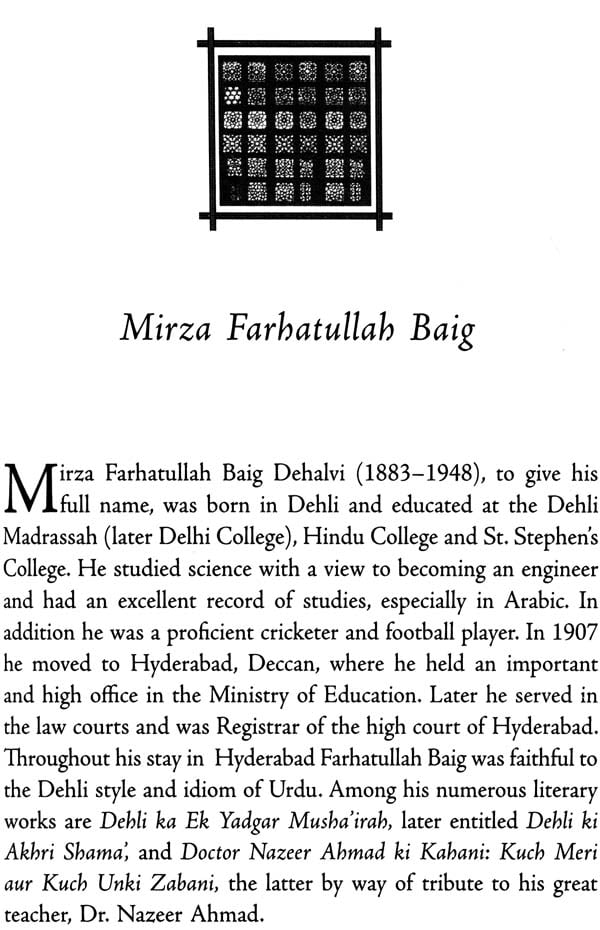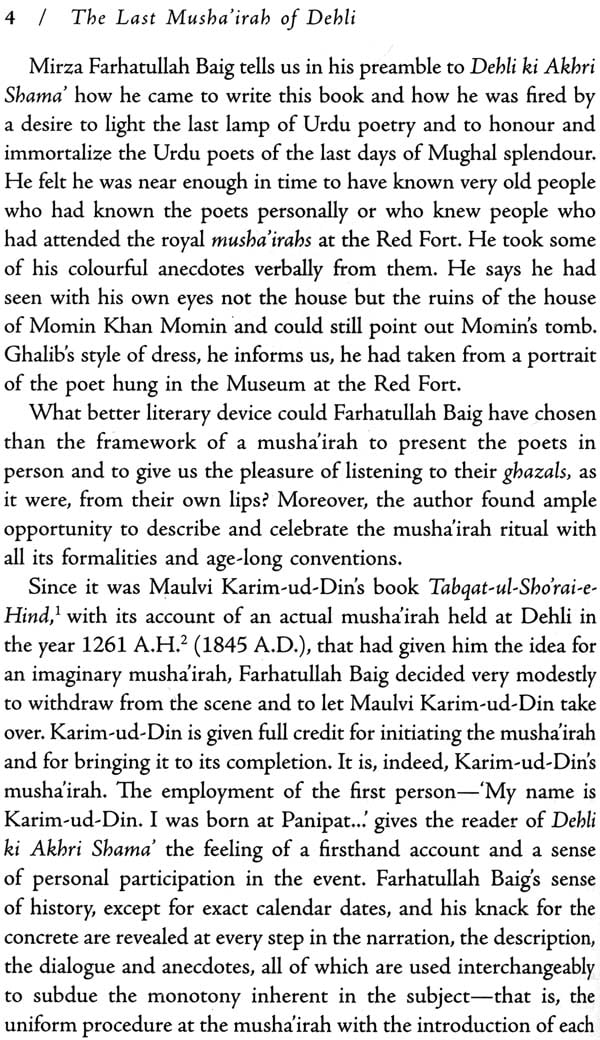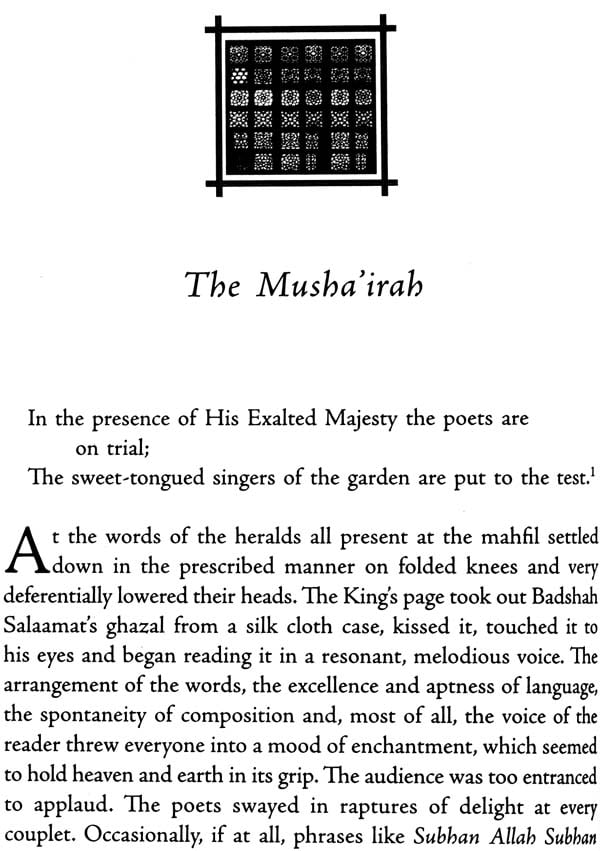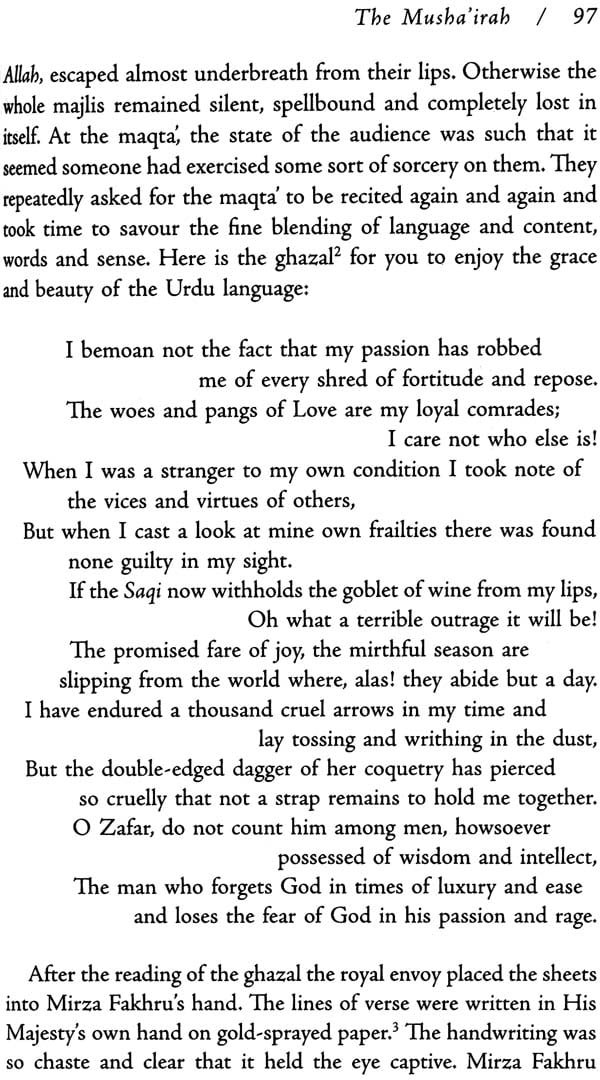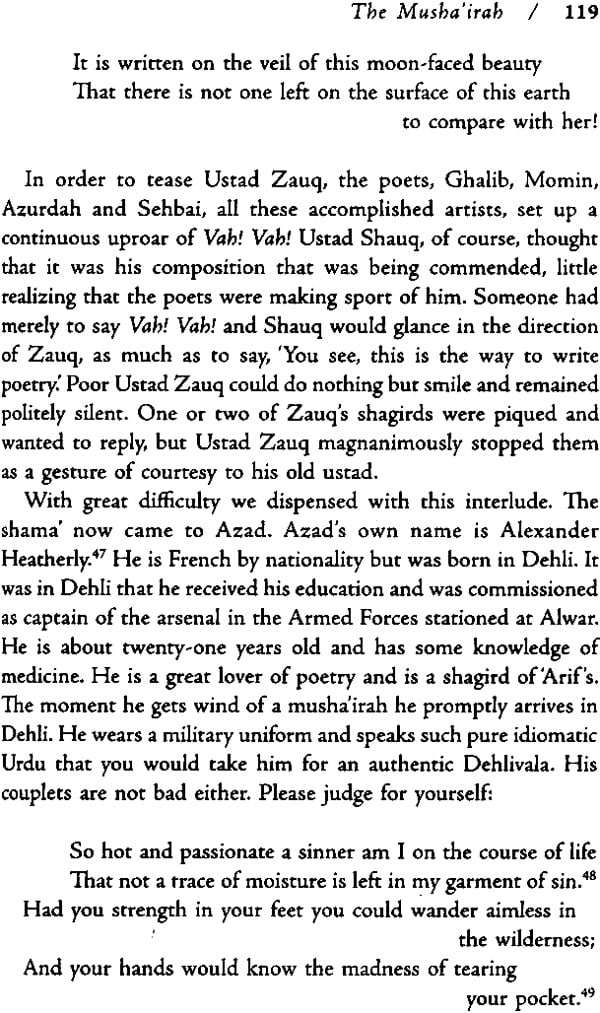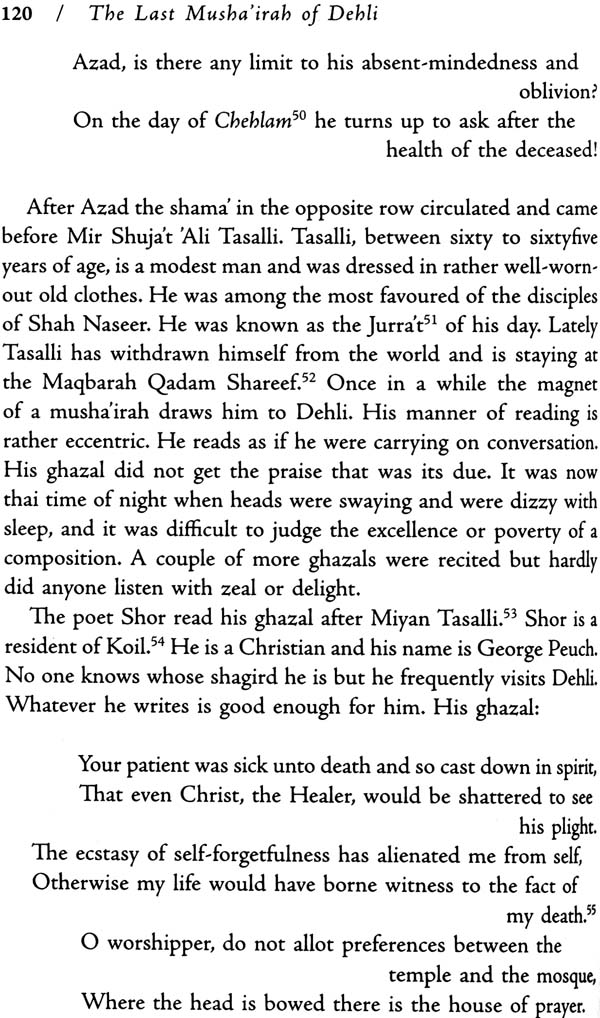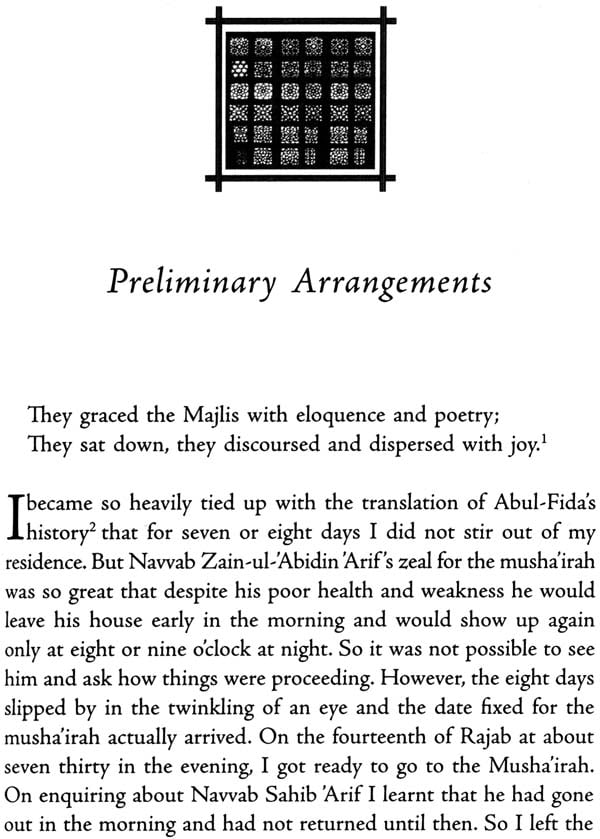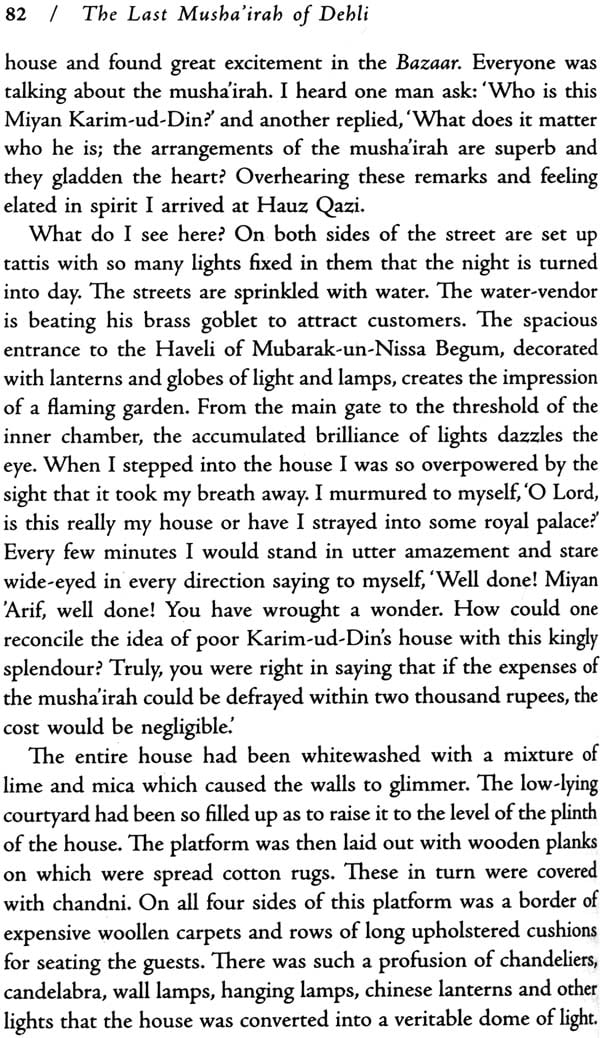
The Last Musha’irah of Dehli
Book Specification
| Item Code: | NAH594 |
| Author: | Akhtar Qamber |
| Publisher: | Orient Blackswan Pvt. Ltd. |
| Language: | English |
| Edition: | 2010 |
| ISBN: | 9788125039679 |
| Pages: | 196 |
| Cover: | Paperback |
| Other Details | 8.5 inch x 5.5 inch |
| Weight | 260 gm |
Book Description
The twilight Delhi of the later Mughals, decadent in statesmanship, devastated by marauders, declining in history, still managed to leave behind something more durable than marble and sandstone: a magnificent body of Urdu poetry and prose.
It is this facet of the city that Mirza Farhatullah Baig Dehalvi capture in this unique literary work. Drawing upon living memory, manuscripts and other documents, he wrote Delhi ki Akhri Shama’, a fictional account of what purports to be the last great Musha’irah held in Delhi under the patronage of Bahadur shah ‘Zafar’, the last Mughal Emperor. The narrative recreates for us the various stages of organizing such an occasion, introduces us to un forgettable people and now-forgotten places, and builds up to the climax—the musha’irah itself—at which all the important Urdu poets of the time are present.
This volume is the first-ever English translation of Farhatullah Baig’s classic, accompanied by a long introduction, textual and other annotations, and an extensive glossary. Much more than a work of translation, this is a labour of love and scholarship.
Akhtar qamber obtained graduate degrees in English literature from the universities of Lucknow and Columbia. She taught at Isabelle Thoburn College, Lucknow, and at Miranda House, Delhi, and visited the International Christian University at Tokyo and Western College for Women at Oxford, Ohio, on teaching assignments. After retiring feom the academic life, Qamber devoted her time to translating from Urdu and Persian into English. Her earlier publications include a collection of poems written originally in English, and a book on the relationship between the work of W.B. Yeats and the Noh drama of Japan.
Dehli ki Akhri Shama' is a fictional-historical account of what might have been the last musha'irah held at Delhi under the auspices of the last Mughal Emperor, Bahadur Shah Zafar II, Urdu's royal patron and poet. This modern Urdu classic, in engaging and somewhat leisurely narrative, with historical fidelity and imaginative detail, gives the plan, arrangement and setting of Karim-ud-Din's musha'irah, a lively portrait-gallery of the living poets of the day and the ghazals read by them on that occasion. Equally vivid, in brief flashes, emerges a picture of Bahadur Shah's court, of the culture, manners, pursuits and ideals of the highly cultivated Mughal society of the time.
This book does not make for easy translation. Farhatullah Baig's prose style is marked by the characteristics of the Urdu of the thirties and forties of our century. The ghazals, a good one-fourth of the book, are naturally in the style and idiom of the great poets of the middle years of the nineteenth century. If one were to be intimidated by the dictum traduttore traditore (translator is traitor) many a masterpiece written in a language other than its own would remain 'a closed privilege. This intrepid translator embarks upon the task with a mixture of dash and aplomb!
The twentieth-century critic Maulana Shibli in his She'r-ul- Ajam chafes against limitations felt by him in translating Persian into Urdu, languages that have much in common. Translation from Urdu into English, languages with entirely separate roots and genius of their own, is prodigiously more demanding. Nor is accuracy in grammar, syntax and vocabulary the only obstacle. The aspects which daunt the translator are the idiom, metaphor, rhythm, onomatopoeia, verbal humour (notably puns), and other linguistic resources that grow out of a particular social and intellectual background.
Doggedly revising and recasting a line of verse, I found that some unamenable nuance had still escaped, especially in the more elusive of the ghazals where the surface conceals still other shades and hints of meaning. Besides, it is not always easy to capture in English the emotional cadences and traditional literary subtleties of Urdu verse. I do not subscribe to the view that a translation be literal, howsoever quaint and charming it might turn out to be! On the other hand, a free and more creative interpretation (some interpretation is inevitable) would fall wide of the mark and dispel the age-long atmosphere surrounding certain inherited terms. My endeavour has been to give the meaning in easy idiomatic English and, at the same time, to communicate some of the conventional tone and flavour of the Urdu language.
Urdu and Persian words and terms explained in the glossary have been italicised on their first appearance in the text. Other explanations and information have been provided in endnotes. I am deeply indebted to Professor A. A. Ansari, Head of the English Department, Aligarh Muslim University, for critically examining my Introduction, written primarily for the uninitiated; to Dr A. W. Azhar, Head of the Persian Department, Jawaharlal Nehru University, for helping to revise the text of the translation; to Dr Siddiqar Rehman Kidwai, also of the Nehru University, and Professor K. A. Farouqi of the Delhi University for elucidating cryptic lines; and to my nephew Kausar, a young architect, for correcting some fine points in my paragraphs on Shah Jahanabad and the Red Fort.
| Translator's Preface | xi | |
| Publisher's Note | xii | |
| INTRODUCTION | ||
| Mirza Farhatullah Baig | 3 | |
| Mughal Dehli-Shah Jahanabad | 8 | |
| Mughal Society | 15 | |
| The Urdu Language | 19 | |
| The Musha'irah | 28 | |
| The Ghazal | 36 | |
| A MUSHA'IRAH IN DEHLI | ||
| Preamble | 51 | |
| The Plan | 56 | |
| Preliminary Arrangements | 81 | |
| The Musha'irah | 96 | |
| Notes | 155 | |
| Glossary | 170 | |
| Bibliography | 176 |
